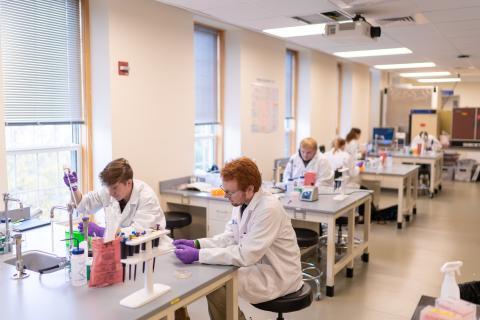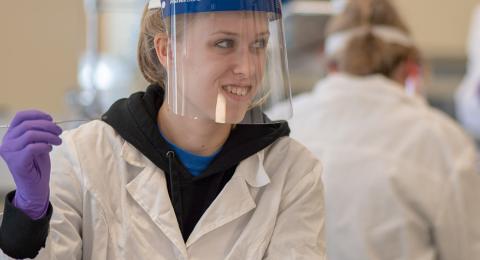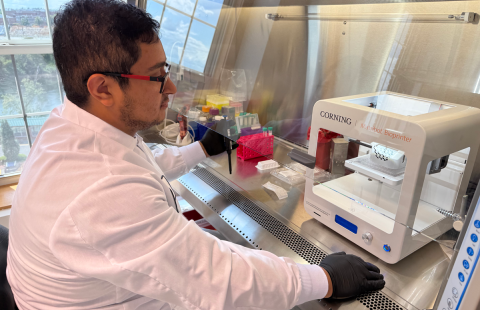The industry-focused M.S. in Biotechnology: Industrial and Biomedical Sciences combines skill-based training in our state-of-the-art laboratory spaces and innovative experiential learning opportunities with local companies. Experience our new Biotechnology Innovation Center (BIC) and the BIC incubator space housing industry partners in the biotech, pharma and medtech fields as you prepare to advance your career in the biotechnology, biopharmaceutical and regenerative manufacturing sectors.
What is biotechnology?
Biotechnology focuses on the application of the biological and biochemical sciences, and particularly genetics, to create new and enhanced biomedical, industrial, agricultural and environmental products. Modern biotechnology (including molecular, cellular and tissue manipulation) has helped us reduce our environmental footprint, utilize cleaner energy, improve manufacturing efficiency and create more than 250 healthcare products that fight debilitating and rare diseases. The field is flourishing in New Hampshire, Massachusetts and worldwide, with a growth of careers in tissue biology, genomics, microbiology, regulatory science, drug development and more.
Why choose UNH Manchester’s M.S. in biotechnology program?
UNH Manchester has expanded its teaching and research facilities in partnership with the Advanced Regenerative Manufacturing Institute (ARMI) and its BioFabUSA program, which is creating an industry to regenerate human tissue and organs right down the road from campus. Through skills-based training in our state-of-the-art lab spaces and with industry partners in biotech, pharma and medtech fields, the M.S. in biotechnology prepares you with laboratory practice, research opportunities, industry experience and transferable job skills to advance your career in the biotechnology, biopharmaceutical and regenerative manufacturing sectors.
Potential career areas
- Biomedical research and development
- Business development
- Clinical research
- Food, animal and environmental science
- Government/policymaking
- Manufacturing
- Process development
- Project management
- Quality assurance/regulatory affairs
- Sales and technical support

Diligent undergraduate students in our biological sciences, biotechnology and neuropsychology programs have the opportunity to earn a bachelor's degree and M.S. in Biotechnology in as few as five years by taking graduate-level classes during senior year at UNH Manchester.
Curriculum & Requirements
Biotechnology focuses on the application of the biological and biochemical sciences, and particularly genetics, to the preparation of new and enhanced biomedical, industrial, agricultural, and environmental products. Graduate instruction in this area would include molecular biology, cell and tissue culturing, protein biologic development, bioinformatics, functional and comparative genomics, applied immunology, DNA sequencing, tissue biology and engineering, industrial microbiology, drug development, intellectual property, clinical trials, biotechnology management and marketing, applicable regulations, and biotechnology ethics.
The M.S. in Biotechnology: Industrial and Biomedical Sciences (MS Biotech:IBMS) program at the University of New Hampshire is a STEM-designated graduate degree program that offers its students innovative experiential learning opportunities and delivers a content-rich, skills-based, and highly versatile curriculum for individuals seeking to advance their careers in the biotechnology, pharmaceutical, and biomanufacturing sectors. Students will complete a project, internship, or co-op experience as part of their degree program. The MS Biotech:IBMS program has a core foundation in the theory and wet-laboratory skills of cell and tissue biology and culturing; protein and immunologic methods and therapeutics; and the molecular biotechnology of nucleic acids. Students are also required to develop a substantial background understanding of biotech product lifecycle and the regulatory and legal implications therein. After demonstrating proficiency in the core biotechnology knowledge areas, MS Biotech:IBMS students will work with a faculty advisor to create a customized program of study that may include content from diverse graduate programs across the UNH campuses.
Full-time students can complete the program in 18 months. Students admitted from a UNH Bachelor’s degree program can complete the Accelerated Master's program in 12 months depending on the courses completed during their undergraduate program. Students choosing the project or internship track would undertake an internship or internships in industry, applied research in an industrial job where the student is already employed, or research in a faculty member’s laboratory at UNH. Students choosing the co-op work experience route would spend 6 months in a full-time industrial placement as part of their degree program.
The MS Biotech:IBMS program welcomes students from varied scientific and other backgrounds who have the required basic skills to succeed in the degree program. Normally, this background includes completion of a Bachelor’s degree (GPA > 3.0) with an introductory biology two-course sequence with lab, a genetics course (lab not required), and at least one semester of organic chemistry. Students with non-biomedical Bachelor’s degrees with these skills are encouraged to apply for admission. UNH Bachelor’s degree students in a variety of curricular areas would similarly be able to apply for admission as an Accelerated student if they meet the pre-requisite requirements above. For all applicants, the MS Biotech:IBMS program recommends this additional level of preparation: one semester of microbiology with laboratory, one semester of bioethics, one semester of cell biology, one semester of statistics, one semester of mathematics to the pre-calculus or calculus level, and one semester of biochemistry. GREs are not required. International students must submit a TOEFL score or equivalent evidence of English proficiency as required by the UNH Graduate School.
The Biotechnology industry in New England is currently expanding at a substantial rate (2018 Job Trends Forecast, MassBioEd Foundation) and graduates of the M.S. in Biotechnology: Industrial and Biomedical Sciences program will be well-prepared for anticipated growth in jobs projected for the biotech R&D, medical testing laboratory, pharmaceutical and biotech manufacturing laboratory instrumentation, academic, and other sectors in New England in the coming years.
Curriculum
The M.S. in Biotech:IBMS is offered in traditional and accelerated formats each of which require students to complete 30 credits comprised of 4 Core Curriculum courses and a Graduate Biotech Seminar course (13 total credits), a series of Elective Courses (8-14 credits), and a Capstone experience (3-9 credits). Traditional full-time enrolled students will be able complete the degree in 18 months. UNH Bachelor's degree students entering into the Accelerated Master’s program as full time students will be able to complete their degree in as little as 12 months.
Core Curriculum
The MS Biotech:IBMS core curriculum is centered around research project team-based lab courses. This provides you with important industry-relevant transferrable job skills, such as clear communication, cooperation and relationship building, teamwork and conflict resolution, and creative problem-solving and strategic thinking. These transferrable skills are developed hand-in-hand with the wet-lab skills. In addition to the core lab and lecture coursework covering the major industry areas of cell, molecular, and protein biochemistry, the program incorporates a core course entitled “Biotechnology Products and Regulation.” This course takes a critical look at industry from the initial stages of research and development in the biomedical sciences through the legal and regulatory stages of biotechnology product development and manufacturing. This content is key to understanding how the biotech industry functions and thus is a centerpiece in your training in our degree program. Finally, you are required to enroll in a minimum of one graduate biotech seminar course. While the specific content of the seminar courses will vary to reflect the dynamics of the ever-changing biotech field, the two typical focus areas of the semester-long seminars will be “Instrumentation in the Biotech Industry” and “Cutting edge topics in the Biotech Industry today”.
| Code | Title | Credits |
|---|---|---|
| Course Requirements | ||
| BIOT 877 | Molecular Biology and Biotechnology (& Lab) | 3 |
| BIOT 853 | Cell Culture (& Lab) | 3 |
| BIOT 825 | Biotech Products and Regulation | 3 |
| BIOT 866 | Protein and Immunological Techniques (& Lab) | 3 |
| BIOT 896 | Graduate Seminar in Biotechnology | 1 |
| Elective Coursework 1 | 8-14 | |
| Capstone Experience Options 2 | 3-9 | |
| BIOT 889 | Biotech Career Planning | 1 |
| Capstone A | ||
| BIOT 893 | Directed Graduate Research | 3-6 |
| Capstone B | ||
| BIOT 891 | Applied Research | 3-6 |
| or BIOT 892 | Graduate Internship | |
| Capstone C | ||
| BIOT 895 | Graduate Co-op Experience | 9 |
- 1
Elective Courses
In addition to the Core requirements, you will develop a curriculum plan with your Faculty Advisor that includes elective courses. This curriculum plan will be customized to meet your career goals. While most students will likely choose elective courses offered in the Department of Life Sciences at UNH Manchester, the program welcomes you to enroll in courses in other UNH colleges in order to complete your elective requirements. In some cases (and with the recommendation of the Faculty Advisor and approval of the Graduate Program Coordinator), courses not on the approved electives list may be incorporated into the curriculum plan.- 2
Capstone
After completion of 9 credits in the MS Biotechnology program, students are required to enroll in at least one credit under Capstone Experience: BIOT 891, BIOT 892, BIOT 895, or BIOT 889. The capstone (up to 9 credits) will be designed and approved by your faculty advisor or the internship and co-op coordinator and will be consistent with your career development plans.
The capstone will consist of one of the following: Capstone A, a research project in a UNH Manchester faculty member’s research laboratory (typically your Faculty Advisor); Capstone B, an internship or applied research experience in an industry setting (including the student’s current workplace if applicable); or, Capstone C, an industry co-op experience. Capstone A or B may earn up to 6 credits, depending upon hours spent in experience as dictated by requirements for credit hours . Capstone C will be a 6 month industry placement at 40 hours per week and earn 9 credits. During your Capstone experience, you will be enrolled in a course in which you will report on your progress in your experience and interact with others participating in capstone experiences as dictated by capstone syllabi.
Accelerated Master's Overview
Accelerated Master’s programs offer qualified University of New Hampshire undergraduate students the opportunity to begin graduate coursework in select graduate programs while completing a bachelor’s degree. Accelerated master's programs are designed to provide students with an efficient and cost-effective pathway to earn both a bachelor's and master's degree or graduate certificate, enhancing career opportunities and long-term earning potential.
Accelerated Master's Highlights
- Begin studying advanced topics while an undergraduate student with the opportunity to complete a master’s degree or graduate certificate early.
- Master’s degree program students: Earn up to 12* graduate (800-level) course credits while completing a bachelor’s degree. This coursework will count as dual-credit toward both the bachelor’s and master’s degrees.
- Graduate certificate program students: Earn up to 8* graduate (800-level) course credits while completing a bachelor’s degree. This coursework will count as dual-credit toward both the bachelor’s degree and the graduate certificate.
- Students complete the bachelor’s degree, and then officially matriculate into the master’s or graduate certificate program to complete the remaining required graduate-level coursework.
*Some exceptions apply.
Accelerated Master's Admission Requirements
- A minimum 3.2 cumulative GPA is required.*
- A minimum of 90 undergraduate credits must be completed prior to enrolling in graduate (800-level) courses.
- Streamlined Graduate School Application (two letters of recommendation; most standardized tests and application fee are waived).*
*Some exceptions apply.
Accelerated Master's Requirements
- Students must attend a mandatory orientation session.
- Students must submit a special registration form each semester for dual-credit courses and note any DegreeWorks exceptions.
- Students may defer graduate matriculation for up to one year after earning their bachelor’s degree in most programs.
- See the Accelerated Master’s Catalog Policy and Accelerated Master’s Website for additional information and a list of programs. Note that some programs have additional requirements (e.g. higher-grade expectations) compared to the general policy.
Biotechnology: Industrial and Biomedical Sciences (M.S.) Accelerated Option
This graduate degree program is approved to be taken on an accelerated basis in articulation with the following undergraduate program(s):
| Code | Title | Credits |
|---|---|---|
| Biological Sciences (B.A.) | ||
| Biotechnology (B.S.) | ||
| Students select from the following approved 800-level courses that can be completed in the undergraduate senior year for dual credit: | ||
| BIOT 804 | New and Emerging Biotechnology | 3 |
| BIOT 837 | Microbial Genomics | 3 |
| BIOT 840 | Antibiotic Discovery Research | 3 |
| BIOT 850 | Cancer Biology: From Benchtop Research to Therapeutic Interventions | 3 |
| BIOT 853 | Cell Culture | 3 |
| BIOT 855 | Advanced Therapies | 3 |
| BIOT 860 | Numerical & Statistical Analysis in Biotechnology | 3 |
| BIOT 866 | Protein and Immunological Techniques | 3 |
| BIOT 870 | Stem Cell and Biomaterials Engineering Laboratory | 3 |
| BIOT 896 | Graduate Seminar in Biotechnology | 1 |
| BIOT 875 | Biopharmaceutical Production Processes | 3 |
| BIOT 877 | Molecular Biology and Biotechnology | 3 |
| BIOT 880 | Techniques in Microscopy and Image Analysis | 3 |
| BIOT 897 | Special Topics in Biotechnology | 1 |
| BIOT 898 | Special Laboratory Topics in Biotechnology | 1-3 |
Program Learning Outcomes
A student successfully completing the Biotechnology:Industrial and Biomedical Sciences program will be able to:
- Demonstrate mastery of core knowledge in fundamental biochemical, cellular, and molecular biological principles, concepts, and theories.
- Demonstrate high-level practical laboratory skill in the areas of mammalian cell culture, molecular biology and microbiology, and protein techniques.
- Successfully employ knowledge of the regulatory and legal framework that underpins the field of industrial biotechnology, including knowledge of pre-clinical and clinical product development, relevant US government regulations and laws, and intellectual property concerns.
- Demonstrate the ability to communicate high-level technical information related to biotechnology in scientific writing and oral presentations to a variety of audiences.
- Understand, analyze, evaluate, and summarize primary research literature involving biotechnology related topics.
- Write at a level and in a style of English consistent with that found in leading academic journals, including understanding and properly using styles of citing, referencing, and formatting appropriate for the field.
- Understand and apply the process of the scientific method, including being able to formulate hypotheses, design and conduct experiments with adequate controls to test hypotheses, interpret and evaluate data, and draw conclusions.
- Gather, analyze, organize, evaluate, and present scientific data, including the use of technology to solve problems and communicate information.
- Demonstrate expertise in quantitative skills including basic math and statistics, use of spreadsheet or statistical software, and graphical presentation of quantitative data.
- Deploy important biotechnology industry-relevant transferrable job skills, such as clear communication, cooperation and relationship building, teamwork and conflict resolution, and creative problem-solving and strategic thinking.
- Demonstrate the ability to function as a member and leader of a team.
- Form a core expertise in an area (or areas) of biotechnology (and allied fields) selected by the student, sufficient to conduct supervised research or other further work (such as industrial development) in that area.
- Successfully undertake a substantial Capstone experience (in industry or in an academic laboratory) in which the student demonstrates sufficient knowledge of the professional, experimental, ethical, communication, and laboratory standards relevant to the selected placement.
- Compete effectively for Masters-level employment and for admission to Ph.D. or other graduate programs in their chosen area and be successful in these endeavors.
Deadlines
Applications must be completed by the following deadlines in order to be reviewed for admission:
- Fall: May 1
- Spring: October 1
- Summer: N/A
Application fee: $65
Campus: Manchester
New England Regional: No
Accelerated Masters: Yes (for more details see the accelerated masters information page)
New Hampshire Residents
Students claiming in-state residency must also submit a Proof of Residence Form. This form is not required to complete your application, but you will need to submit it after you are offered admission, or you will not be able to register for classes.
Transcripts
If you attended UNH or Granite State College (GSC) after September 1, 1991, and have indicated so on your online application, we will retrieve your transcript internally; this includes UNH-Durham, UNH-Manchester, UNH Non-Degree work and GSC.
If you did not attend UNH, or attended prior to September 1, 1991, then you must upload a copy (PDF) of your transcript in the application form. International transcripts must be translated into English.
If admitted, you must then request an official transcript be sent directly to our office from the Registrar's Office of each college/university attended. We accept transcripts both electronically and in hard copy:
- Electronic Transcripts: Please have your institution send the transcript directly to grad.school@unh.edu. Please note that we can only accept copies sent directly from the institution.
- Paper Transcripts: Please send hard copies of transcripts to: UNH Graduate School, Thompson Hall- 105 Main Street, Durham, NH 03824. You may request transcripts be sent to us directly from the institution or you may send them yourself as long as they remain sealed in the original university envelope.
Transcripts from all previous post-secondary institutions must be submitted and applicants must disclose any previous academic or disciplinary sanctions that resulted in their temporary or permanent separation from a previous post-secondary institution. If it is found that previous academic or disciplinary separations were not disclosed, applicants may face denial and admitted students may face dismissal from their academic program.
Letters of Recommendation: 2 Required
Recommendation letters submitted by relatives or friends, as well as letters older than one year, will not be accepted.
Personal Statement/Essay Questions
Prepare a brief but careful statement regarding:
- Reasons you wish to do graduate work in this field, including your immediate and long-range objectives.
- Your specific research or professional interest and experiences in this field.
Resume
Current resume limited to no more than one page.
Important Notes
All applicants are encouraged to contact programs directly to discuss program-specific application questions.
International Applicants
Prospective international students are required to submit TOEFL, IELTS, or equivalent examination scores. English Language Exams may be waived if English is your first language. If you wish to request a waiver, then please visit our Test Scores webpage for more information.
Explore Program Details
-
Associate ProfessorAssociate Professor of Biological Sciences and of BiotechnologyAffiliate Faculty Member, Hubbard Center for Genome StudiesEmail: Kyle.MacLea@unh.eduPhone: (603) 641-4129
-
Adjunct Faculty
UNH Manchester has transformed its sixth floor into the Biotechnology Innovation Center, a facility for teaching and research in the areas of biotechnology and cellular biology. This recent expansion on our campus opens doors to on-site internship and research opportunities with the Advanced Regenerative Manufacturing Institute (ARMI) and other start-up biotechnology firms.
Students will get hands-on experience in our state-of-the-art cell-culture teaching laboratory, upstream and downstream processing suites, pilot production laboratory and more. Labs are stocked with the latest, cutting-edge equipment and are taught by residential faculty or experienced practitioners, all of whom specialize in their discipline.
Graduates of the M.S. program will be prepared to advance their careers in the biotechnology, biopharmaceutical and biomanufacturing sectors. With the biotech sector rapidly advancing, the Bureau of Labor Statistics projects growth in many related professions between 2018 and 2028.
|
Job Title |
Job Growth* |
Median Salary** |
|
Biochemist or Biophysicist |
6% |
$93,280 |
|
Biomedical Engineer |
4% |
$88,550 |
|
Medical Scientist |
8% |
$84,810 |
|
Microbiologist |
5% |
$71,650 |
|
Pharmacist |
n/a |
$126,120 |
|
Physician or Surgeon |
7% |
$208,000+ |
|
Veterinarian |
18% |
$93,830 |
* Bureau of Labor Statistics, projected job outlook from 2018 to 2028. The average growth rate for all occupations is 5 percent.
** Bureau of Labor Statistics, median annual wages reported in May 2018.
Tuition & Fees
The anticipated tuition rates and fees for the academic year are available here. Please note that these are subject to change.
Financial Aid
You may complete the Free Application for Federal Student Aid (FAFSA) to apply for Federal Unsubsidized Direct Loans, the only form of federal financial aid available to graduate students. The basic eligibility requirements to be considered for Financial Aid include:
- Enrollment in a degree program
- Attending classes at least half-time (5 or more credits per semester)
- Documentation of United States citizenship or eligible non-citizen status
- Must maintain satisfactory academic progress
Our Biotechnology program welcomes students from all over the world, and the UNH Manchester campus is located in the heart of a city that embraces cultural diversity. Read more about our city.
Getting Your Visa
The office of International students will assist you with your visa process. Visit our graduate International Students page for further details about the application process and other questions you may have.















